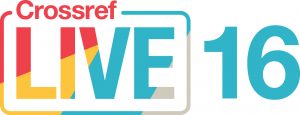2 minute read.Crossref’s Annual Meeting is now Crossref LIVE16
Everyone is invited to our free annual event this 1-2 November in London. (Register here)!
In years past, only Crossref members typically attended the [Crossref Annual Meeting](/crossref-live-annual). This year, we looked at the event with new eyes. We realized that we’d have even richer conversations, more creative energy, and the meeting would be even better for our members if we could rally the entire community together. So we decided to re-develop our annual event from the ground-up.

The result is Crossref LIVE16, an event with a new format and a new focus on the entirety of the scholarly communications community. We are opening doors for the whole community, welcoming publishers, librarians, researchers, funders, technology providers, and Crossref members alike.
- 1st November - Mashup Day, from 12 noon: an afternoon of interactive activities including mingling with the Crossref team and special guests, trying out our services, live troubleshooting, and exclusive previews of some exciting things we’re working on. Plus entertainment and refreshments at an early evening reception.
- 2nd November - Conference Day: a full-day plenary session with distinguished keynote speakers including April Hathcock (NYU), Carly Strasser (Moore Foundation), Ian Calvert (Digital Science), and Dario Taraborelli (Wikimedia Foundation). We will provide the most important updates about our services, and share our vision and strategies for the future.
Note: You are welcome to join us for both days or just one day, as you like.
Location: The Royal Society, London, UK.
We hope you will join us, and extend this invitation to your colleagues.
This is going to be fun.
Register here
Further reading
- Nov 11, 2015 – The logo has landed
- Dec 9, 2024 – A summary of our Annual Meeting
- Oct 13, 2020 – Calling all 24-hour (PID) party people!
- Aug 29, 2019 – Speaking, Traveling, Listening, Learning
- Aug 18, 2019 – We'll be rocking your world again at PIDapalooza 2020
- Aug 11, 2019 – LIVE19, the strategy one: have your say
- Jan 22, 2019 – Myth busting in Mumbai
- Dec 27, 2018 – LIVE18: Roaring attendees, incomplete zebras, and missing tablecloths






